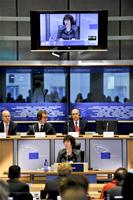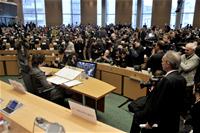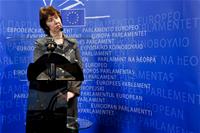Catherine Ashton - as good as it gets
euinside, January 19, 2010
 A lot has been said and written on whether the first candidate for the new European post of a High representative for foreign affairs and security policy Catherine Ashton has performed well at the hearing in the European Parliament last week. However, when we make such an estimation we should also take into account that there were too many expectations even when the Lisbon Treaty was being negotiated but not many of those expectations remained in the last version of the Treaty which came into force on the 1st of December 2009.
A lot has been said and written on whether the first candidate for the new European post of a High representative for foreign affairs and security policy Catherine Ashton has performed well at the hearing in the European Parliament last week. However, when we make such an estimation we should also take into account that there were too many expectations even when the Lisbon Treaty was being negotiated but not many of those expectations remained in the last version of the Treaty which came into force on the 1st of December 2009.
Having said this, the hearing of Lady Ashton in the Foreign Affairs Committee in the European Parliament last Monday was also pressured by a lot of expectations. In fact, those expectations were as if the European foreign minister would have been heard. And, true, most media started calling the high representative a foreign minister of the EU but mostly for shortness and not that much for reliability. The truth is that the powers of the new high representative are not even close to those of a national foreign minister. Catherine Ashton will preside over the General Affairs and External Relations Council (GAERC), which gathers together the foreign ministers of the Union to discuss foreign policy issues as well as internal European affairs. She will also coordinate the positions and opinions of member states on foreign priorities of the Union as well as when there is a need to react urgently on an international crisis.
From this point of view, the performance of the British candidate baroness Catherine Ashton was more than satisfactory. She demonstrated self-confidence and knowledge on all major issues related to foreign policy, she easily defined the hot spots around the world where the EU should obligatory get involved or increase its presence one way or the other. She also set the main priorities of the Union.
The baroness was often criticised at the hearing because she claimed that her first and utmost priority would be the creation of the new European External Actions Service (EEAS), envisaged in the Lisbon Treaty. The conflict came because, first this has to either way be done, according to the MEPs and, second they got irritated by Catherine Ashton's reluctance to let all candidates for job in the EEAS to be heard by the Parliament. Such a question was asked by the Bulgarian MEP Christian Vighenin. During his first question, asked on behalf of his group (Socialists and Democrats) he was interrupted for being out of time so Ms. Ashton had to "guess" his question. Vighenin seized the opportunity for a remark or a second question, starting with the following explanation:
"Sometimes it is difficult to speak in your own language - this is why I will try English now. My question was very specific - would you agree that the appointments in the EEAS should be subject to hearings in the EP?" Baroness Ashton responded by saying that it would be very difficult a whole group of employees to be separated to deal with this issue only. On further questions on the issues she added that such hearings would take a lot of time and the EEAS should start work as soon as possible. The ambition of Lady Ashton is the service to be ready by the end of April so as to be approved by the European Council (EU's leaders). But she reassured that the selection of the diplomats would be good.
The MEP from the European Peoples Party Andrey Kovachev also expressed disappointment: "You have disappointed us when you said that you are not convinced in the need of hearings for all senior diplomatic representatives. For the sake of transparency and responsibility are you ready to consider hearings at least of the representatives in those countries you defined as strategic, like the US, India, Brazil, Japan?" Catherine Ashton answered negative to this question as well:
"I am sorry to disappoint you. It is always unpleasant to disappoint someone but I do not think that there will be a lot of representatives in many countries. I will do so that the best people are chosen for the job. I am not convinced that the hearings, which are not mentioned in the Treaty, are a good idea. The decisions should not be taken out of the institutions where they are taken"*.
Ashton was also attacked for her field being dispersed among other commissioners - like  Enlargement and the Neighbourhood Policy, Development and the field of the Bulgarian candidate - International Cooperation and Humanitarian Aid. As the High representative said that she would not deal mainly with the Neighbourhood policy because the Czech nominee Stefan Fuele would work on it, this again led to disappointment of an MEP from the group of the Greens/EFA. She was also asked what she was supposed to do since others would deal with this so important policy.
Enlargement and the Neighbourhood Policy, Development and the field of the Bulgarian candidate - International Cooperation and Humanitarian Aid. As the High representative said that she would not deal mainly with the Neighbourhood policy because the Czech nominee Stefan Fuele would work on it, this again led to disappointment of an MEP from the group of the Greens/EFA. She was also asked what she was supposed to do since others would deal with this so important policy.
According to Ashton though, there was no problem - having so many commissioners, responsible with different aspects of foreign policy was an advantage rather than failing.
The second group of questions which caused division among MEPs was the past of the candidate as a treasurer of the Campaign for Nuclear Disarmament. Most of the questions were whether she was still sharing the idea of nuclear disarmament, especially in the Iranian context. "I don't think that the realities of the 70-ies are the same as in 2010. The ideas then are not relevant today", Lady Ashton replied and added that she was not a member of the CND for a long time but that the idea itself for nonproliferation of nuclear arms was relevant nowadays too. Other MEPs though defined her participation in the CND as the best point in her CV.
Asked about the importance of India for the EU, Catherine Ashton said that India was a very important factor in the region. This would be one of the countries she intended to visit as soon as possible, especially against the background of her ambition to turn EU's role in Afghanistan into something more serious. She added that Europe and the US should combine their efforts in Afghanistan. This might happen on the 28th of January when in London an international meeting would take place for Afghanistan. Her statement on the topic, by the way, although it did not provoke big interest, was important anyway because in the end of last year the EU approved an Action plan for Afghanistan, received coldly by Washington because it does not state clearly how would this help Americans in their military actions there.
But according to Ashton, the EU will focus its efforts on humanitarian and political sectors and not in military actions.
A large part of the hearing was devoted to questions about the Middle East and, predominantly, about the Israeli-Palestinian conflict. The High representative-designate spoke cautiously on the topic, on which there is no common position of the EU. However she stressed that Israel had the right to exist calmly and securely. The same goes for Palestine, The Israeli-Palestinian conflict was also discussed in the context of Iran.
"It's a pity Iran did not accept the proposal of IAEA (the International Atomic Energy Agency). The MEPs know that this is a country which exists for a long time. For all these years it made mistakes. But if it wants to be respected for its history and its present, Iran should work together with us. I am sorry for human rights' violations there - there is no excuse for us to be slow there. We shave shown tremendous patience - Solana held meetings, we had proposals, we were ready to hold dialogue but on the basis of the principles which we have outlined", Catherine Ashton noted.
She added that the Union of the Mediterranean was a very important body for the development of relations between the EU and the nations of the Union but the Arab countries often block its activities.
About Russia the candidate said the EU needed goo relations with the country. But to ensure that this would happen the Union should have a clear energy strategy. It was very important Russia not to consider energy as a political issue. "We are in the middle of the review of our partnership. Unfortunately we don't have much progress in some areas like human rights. They are always a part of our talks. It is important to find the right approach to put the issues and I will focus my efforts on this", Lady Ashton added.
 Asked whether the EU should have a single place in the Security Council of the UN, the candidate admitted: "To be honest I don't know - you caught me here. For the last 5 weeks I did not have time to have myself prepared on the topic but I think that this matter should be discussed".
Asked whether the EU should have a single place in the Security Council of the UN, the candidate admitted: "To be honest I don't know - you caught me here. For the last 5 weeks I did not have time to have myself prepared on the topic but I think that this matter should be discussed".
And regarding the war in Iraq Catherine Ashton said that she was a minister when the war started. That is why she considered the decision as right given the conditions then. AT present though, the target was Iraq to become a stable and prosperous nation.
The 3-hour hearing raised a lot more issues from the foreign policy of the EU on which Lady Ashton, if nothing else, seemed well aware of and demonstrated intentions to consider some of them in details. Some MEPs were disappointed by her performance but according to others she did brilliantly. Again, we have to underline that the disappointment came because of the too high expectations. But for them the Lisbon Treaty is to blame and not Catherine Ashton.
*The translation in English is from Bulgarian